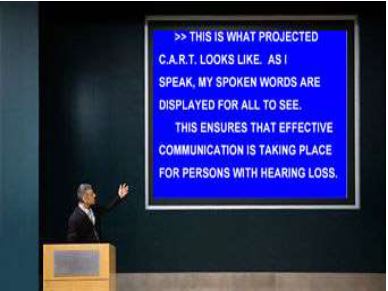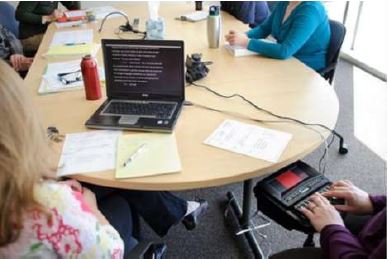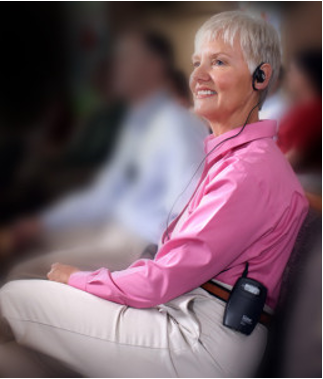Age, Hearing Loss, and Communication: What Are My Rights?
Aging with a Disability Factsheet Series
![]()
Click here for a printer friendly version.
Jump to section:
- Disability and the ADA
- Effective Communication
- Effective Communication in Different Settings
- Auxiliary Aids and Services for Hearing Loss
- Effective Communication for Companions
- Conclusion
- Additional Resources
People may experience some hearing loss as they age that could affect their ability to communicate and enjoy life. Hearing loss is the most recognizable age-related disability in older adults. Unfortunately, many adults with hearing loss feel isolated or left out and may choose to avoid participating at all. Hearing loss may also affect access to important information from health care providers or legal professionals.
This factsheet explains your rights as a person with hearing loss under the Americans with Disabilities Act (ADA) and provides an overview of communication access (called "effective communication" in the ADA law) in your community.
Disability and the ADA
While you may think that declining hearing is just a part of getting older, this condition may be significant enough to be a disability under the ADA. Under the ADA, the term "disability" refers to a physical or mental condition that limits one or more major life activities. The ADA offers protections to millions of individuals with disabilities and has increased accessibility so that individuals with disabilities can continue to take part in community life.
Effective Communication
"I wish I could understand better when I attend the movies and theater."
"I'm not sure what the doctor said about the surgery procedures."
Effective communication is an important part of the ADA. Under the ADA, the term "effective communication" means that information must be as clear and understandable to people with disabilities as it is for people who do not have disabilities. Clear communication is important because it allows full participation and equal access to activities, services, and events in your community.
Effective Communication in Different Settings
People have different needs for communication in different settings. For example, in brief or simple face-to-face exchanges, written notes may be effective when a person with significant hearing loss asks for a copy of a form to fill out. Using a smart phone might work fine to write and exchange messages with a pharmacist when requesting a prescription. However, complex or lengthy exchanges (for example, when participating as a juror in court proceedings) may require more sophisticated strategies involving auxiliary aids and services.
Auxiliary Aids and Services for Hearing Loss
Under the ADA, you can request auxiliary aids and services that will enhance your ability to participate in your community. The term "auxiliary aids and services" refers to different ways to provide equal access to communication for people with disabilities. Some common aids for hearing loss include assistive listening systems and communication access real-time translation.
- Assistive Listening Systems (ALS) are amplifiers that bring sound directly into the ear. They work by separating the sounds that you want to hear from background noise. ALS can be used by people with different types and degrees of hearing loss. Movie, cinemas, theaters, courts, and some medical facilities offer ALS. You just need to ask for them.
A woman is wearing a wireless assistive hearing device called an "FM system."
Image courtesy of Listen Technologies.
- Communication Access Realtime Translation or "CART" is a way to convert spoken words to text that can be displayed on your personal laptop or hand-held device. It is similar to closed cpationing which allows you to follow the audio for a TV show or a large, live-recorded event. CART is typically used for important exchanges of information such as job interviews, medical appointments, and court proceedings. Since CART requires a trained professional to type the words to text as well as equipment, you must request CART services and schedule them prior to the start of the event.
Closed captioning is provided for an audience at a live theater show.

CART is provided for an individual with hearing loss on a large screen at a conference.
Image courtesy of Caption Crew.

CART is provided for an individual with hearing loss on the individual's personal laptop at
a work meeting.
Effective Communication for Companions
Under the ADA it is also important to know that auxiliary aids and services may need to be provided to spouses, partners, family members, and close associates with hearing loss. For example, if your spouse has a court appointment, you as a family member with a hearing loss would have rights under the ADA to require an auxiliary aid or service to be able to participate and have full communication access.
Conclusion
Hearing loss can be a frustrating and isolating experience, but it doesn't have to be. Understanding your rights to communication access and the availability of auxiliary aids and services can greatly enhance your ability to communicate and participate in life. the resources listed on the following page offer more information about additional supports, available technology, and your legal rights.
Additional Resources
Hearing Loss Association of America (HLAA)
Job Accommodation Network (JAN)
Effective Communication Under the ADA
For more information on your rights to communication access under the ADA, contact your regional ADA center via the ADA National Network
Authorship
"Aging, Hearing Loss, and Communication: What are My Rights?" was developed by Michael Richardson, Director of the NW ADA Center and published by the University of Washington Aging RRTC. Content is based on research evidence and/or professional consensus.
Disclaimer
This information is not meant to replace the advice from a medical professional. Consult with a qualified and licensed health care provider in your state.
Suggested attribution:
University of Washington. (2018). Aging, Hearing Loss, and Communication What Are My Rights? [Factsheet]. Aging Well with a Physical Disability Factsheet Series. Heathy Aging & Physical Disability RRTC. http://agerrtc.washington.edu
Healthy Aging RRTC:
Factsheets - Aging Well with a Physical Disability:
- How to Stay Physically Active
- Hope to Cope with Depression
- How to Sleep Better
- Tips for Improving Memory & Thinking
- Employment Concerns
- How to Prevent Falls
- How to do a Lot with a Little: Managing Your Energy
- How to Get the Most Out of Your Health Care Visits
- How to Find Trustworthy Health Info from the Internet
- Provider's Guide for our Factsheets






